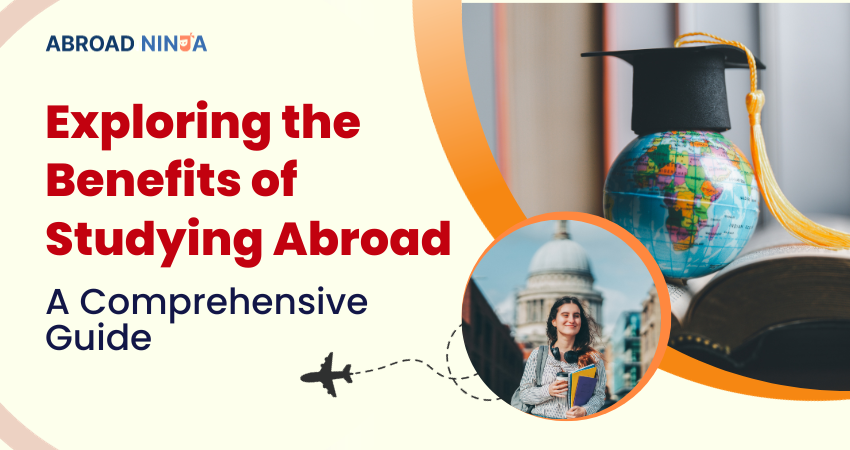Studying abroad offers many advantages beyond the classroom. You can broaden your horizons, gain independence and learn intercultural communication skills by immersing yourself in a foreign culture. This guide – “Discover the Benefits of Studying Abroad” explains why studying abroad is a valuable experience.
You can acquire a global outlook and experience different cultures, ideas, and languages by living and studying in a foreign country. Interacting with people from other backgrounds can help you appreciate cultural variety and improve your ability to manage cross-cultural interactions. Also, you will develop adaptability skills as you adjust to the new environment – which can be beneficial in both personal and professional life.
Furthermore, studying abroad provides the chance to explore academic fields from an international point of view. Universities around the world offer unique courses or specialized programs that may not be available at home. This exposure to different educational methods can expand your intellectual perspectives and enhance your learning experience.
In addition to academic growth, studying abroad can help with personal development. You must leave your comfort zone to live independently in a foreign country. This forces you to handle unfamiliar situations, make decisions on your own, and build self-confidence. These new skills will not only contribute to your growth but also help you become more employable in a globalized workforce.
Pro Tip: Before you go, research any potential scholarships or funding opportunities. Many organizations provide financial assistance for students seeking an international education.
Benefits of Studying Abroad
Studying abroad has many advantages that can make your educational experience great. It lets you grow personally, understand different cultures, and become academically excellent. Here are four benefits:
- A Global Perspective: Being in another country allows you to learn about global issues and perspectives. This experience teaches empathy, adaptability, and open-mindedness – qualities needed for success today.
- Language Skills: Immerse yourself in a language-learning environment. Speak with native speakers to become fluent. Knowing a foreign language helps you access new cultures and makes you more valuable professionally.
- Academic Excellence: Experience universities with great programs. Have access to experts and resources to broaden your knowledge and refine your skills. Different teaching methods will help your critical thinking and innovation.
- Career Opportunities: Employers value those who have studied abroad. The international experience gives you skills like intercultural communication and problem-solving, which makes you a desirable job candidate.
There are more benefits to studying abroad. You can build a global network of contacts and learn about sustainability, human rights, and social justice.
To make the most of it:
- Immerse Yourself: Get involved in the local culture. Participate in events or join clubs related to your interests. Get to know the customs and traditions.
- Go Out of Your Comfort Zone: Take chances to do new activities or explore unfamiliar places. By doing this, you’ll discover hidden strengths and gain confidence.
- Seek Academic Support: Utilize services provided by the host institution. Use tutoring or study groups to adjust to the different educational system.
- Be a Cultural Ambassador: Share your culture by organizing events or presentations. This promotes cultural exchange and helps you become a leader and communicator.
Take advantage of your study abroad journey. So, get ready and embark on an adventure that will shape you into a global-minded individual ready for any challenge. Know More – Abroad Ninja
Preparing for Studying Abroad
Prep for studying abroad? It takes careful planning & organization! Here’s a step-by-step guide to help you prepare:
- Research your destination. Learn the culture, customs & language.
- Pick the perfect program. Consider factors such as courses, length & intern/volunteer opps.
- Secure docs like passports, visas & insurance. Check entry requirements & arrange vaccinations.
- Financial planning. Budget for tuition, living expenses, travel & more. Look for scholarships & job options.
- Mental prep. Familiarize yourself with coping strategies & stay open-minded for new experiences.
Think of aspects like accommodation, communication (like buying a local SIM!), packing & setting academic goals. To make the most of your experience abroad: immerse yourself in the culture, take language classes, make friends from different backgrounds, keep an open mind & keep in touch with home. Follow these tips & have a journey full of life-long memories!
Also Read: How to Go Abroad For Studies After 12?
Choosing a Destination
Choosing a destination for studying abroad is an exciting decision! With so many options, it can be overwhelming. To narrow down choices, consider culture, language, academic reputation, and personal interests.
Cultural experience is important. Each country has its own unique customs, traditions, and way of life. By immersing in a different culture, students can broaden their horizons. This can greatly enhance personal growth!
Language is another factor. Studying abroad is an excellent opportunity for language acquisition. Living in a country where the chosen language is spoken daily helps to enhance fluency and gain communication skills. Plus, speaking a foreign language is valued by employers.
Academic reputation matters too. Research universities or institutions with strong programs in one’s field of study. This ensures access to high-quality education and resources. Furthermore, studying at renowned institutions can boost resumes and increase career prospects after graduation.
The Institute of International Education reported that over 332,000 U.S. students chose Europe as their preferred study abroad destination. Don’t miss out on this global opportunity!
Also Read: 7 Best Study Abroad Programs in 2023
Academic Considerations
Studying abroad has various considerations for students to keep in mind. These include:
- Course Offerings: Universities abroad may offer a wider range of courses in your field of interest.
- Language Requirements: Check if a proficiency in a certain language is needed. Consider brushing up on language skills.
- Credit Transfers: Make sure credits are transferred back to your home university. Consult with academic advisors.
Studying abroad also exposes you to different teaching styles, cultural perspectives, and academic challenges. They can contribute to personal growth. Don’t miss out on the amazing opportunities. Embrace the adventure! Expand your horizons. Seize chances to broaden your knowledge and skills beyond borders. Start planning today! Know More – Abroad Ninja
Living Arrangements and Cultural Immersion
Living arrangements and cultural immersion are key features of studying abroad. This section looks into the available options and how they support cultural integration.
- Homestays: Living with a local family gives an immersive experience to learn about customs, language, and traditions. It builds strong connections and allows for a real cultural exchange.
- Student Residences: These accommodations provide a chance to live with peers from different cultures. They offer a supportive community, modern facilities, and organized social activities to make friends and experience the host culture.
- Shared Apartments: Renting an apartment with other international students or locals grants independence and flexibility. It develops self-reliance while blending in with the locals.
Study abroad programs may include language courses, mentors, or cultural activities to introduce students to the host society.
Studying abroad not only expands one’s outlook, but can also be transformative. Take John, who opted for a homestay in Japan. Through daily meals, local festivals, and tea ceremonies, he became deeply involved in Japanese customs and created long-term bonds.
Exploring living arrangements while studying abroad brings invaluable insights into another culture’s lifestyle. By engaging in shared experiences with locals or international students, individuals gain a deeper understanding of their environment outside textbooks and classrooms.
Also Read: Top 10 Reasons Why you should study Abroad
Challenges and Tips for Overcoming Them
Studying abroad can have its own unique challenges. Here are some tips to help you out!
- Language Barrier: Immerse yourself in the local culture. Take classes and practice with native speakers.
- Homesickness: Stay connected with friends and family. Join clubs or organizations and explore.
- Adapting to a New Environment: Embrace change. Be open-minded and seek out new experiences.
- Cultural Differences: Educate yourself about the host country’s customs and traditions. Ask questions and be respectful.
- Academic Challenges: Seek support from professors and classmates. Develop study habits and use academic resources.
- Financial Management: Create a budget. Look for scholarships and part-time job opportunities. Make smart decisions.
Also, find a network of international students for guidance. Challenges are part of the journey – it’s ok to embrace them!
My friend was studying in Japan and felt isolated due to cultural differences. She joined clubs and connected with her Japanese classmates. She gradually formed meaningful relationships and began to feel more at home. The story shows the importance of perseverance and stepping out of your comfort zone.
Conclusion
In conclusion – “Discover the Benefits of Studying Abroad”, studying abroad offers many benefits, making it an appealing option for students who want a life-changing experience. It exposes you to different cultures, which helps you grow and expands your global perspective. It also encourages independence, adaptability, and resilience. Plus, it boosts language skills and provides valuable networking chances with international peers. Undeniably, this immersive experience can shape personal and professional development significantly.
We covered many aspects of studying abroad in this guide. We went over the academic advantages, like access to top-notch universities and specialized courses. We examined the cultural immersion that helps you to gain a deep understanding of the host country’s customs, traditions, and lifestyle. Plus, we looked at the personal growth that comes from overcoming challenges in a foreign environment and growing self-reliance.
In addition, studying abroad gives you experiences that may not be accessible in your home nation. For example, engaging in volunteer work or internships overseas can give you practical skills and make a positive contribution to local communities. These chances foster empathy, compassion, and cross-cultural communication skills that are essential for success in today’s interconnected world.
It’s a known fact that according to a study by the Institute of International Education (IIE), more than 300,000 U.S. students studied abroad in the 2018-2019 academic year. This shows the increasing recognition and popularity of studying abroad as an invaluable educational pursuit.
Also Read: Why is Counseling Important for Study Abroad Plans?
Frequently Asked Questions
Q1: Why should I study abroad?
A: Studying abroad offers numerous benefits such as gaining a global perspective, experiencing different cultures, enhancing language skills, and expanding career opportunities.
Q2: How will studying abroad enhance my career prospects?
A: Studying abroad showcases your willingness to step out of your comfort zone, adapt to new environments, and interact with diverse individuals. This experience can make you more competitive in the job market and increase your cultural intelligence.
Q3: Are scholarships available for studying abroad?
A: Yes, there are various scholarships and grants available for students interested in studying abroad. These scholarships can cover a significant portion of your expenses, including tuition fees and living costs. It is advisable to research and apply for scholarships specific to your destination and field of study.
Q4: Can I study in a non-English speaking country if I’m not fluent in their language?
A: Yes, many universities offer programs taught in English, even in non-English speaking countries. However, learning the local language can greatly enhance your experience and interaction with the local community. It is recommended to take language courses or seek language exchanges to improve communication skills.
Q5: How can studying abroad improve my language skills?
A: Immersion in a foreign country exposes you to the language on a daily basis, helping you to develop fluency and confidence. Communicating with native speakers, taking language courses, and participating in cultural activities are effective ways to enhance your language skills.
Q6: What are the financial considerations of studying abroad?
A: Studying abroad may involve costs such as tuition fees, accommodation, transportation, visas, and daily expenses. It is important to create a budget and explore financial aid options, scholarships, and part-time job opportunities. Planning ahead and managing your finances diligently can help ensure a smooth experience.




